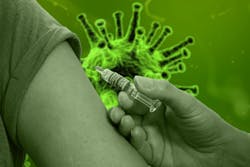A fourth Phase 3 clinical trial evaluating an investigational vaccine for COVID-19 has begun enrolling adult volunteers. The trial is designed to evaluate if the investigational Janssen COVID-19 vaccine (JNJ-78436725) can prevent symptomatic COVID-19 after a single dose. Up to 60,000 volunteers will be enrolled in the trial at up to nearly 215 clinical research sites in the United States and internationally, according to press releases.
The Janssen Pharmaceutical Companies, a subsidiary of Johnson & Johnson, developed the investigational vaccine (also known as Ad.26.COV2.S) and is leading the clinical trial as regulatory sponsor. Janssen, the National Institute of Allergy and Infectious Diseases (NIAID), part of the National Institutes of Health (NIH), and the Biomedical Advanced Research and Development Authority (BARDA), part of the U.S. Department of Health and Human Services' Office of the Assistant Secretary for Preparedness and Response, are funding the trial.
In parallel, Johnson & Johnson said it has also agreed in principle to collaborate with the United Kingdom on a separate Phase 3 clinical trial in multiple countries to explore a two-dose regimen of Janssen’s vaccine candidate.
Other vaccines in Phase 3 trials are mRNA-1273, an investigational vaccine co-developed by NIAID and Moderna; AZD1222, a vaccine candidate being developed by AstraZeneca; and BNT162b2 from Pfizer and BioNTech.
The Janssen vaccine candidate is a recombinant vector vaccine that uses a human adenovirus to express the SARS-CoV-2 spike protein in cells. Adenoviruses are a group of viruses that cause the common cold. However, the adenovirus vector used in the vaccine candidate has been modified so that it can no longer replicate in humans and cause disease. Janssen uses the same vector in the first dose of its prime-boost vaccine regimen against Ebola virus disease (Ad26.ZEBOV and MVA-BN-Filo) that was recently granted marketing authorization by the European Commission.
Preclinical findings published in Nature show that the investigational Janssen COVID-19 vaccine induced neutralizing antibody responses in rhesus macaques and provided complete or near-complete protection against virus infection in the lungs and nose following SARS-CoV-2 challenge. The safety, reactogenicity and immunogenicity of the investigational vaccine are being evaluated in a Phase 1/2a trial in the United States and Belgium. Positive interim results from the Phase 1/2a clinical study demonstrated that the safety profile and immunogenicity after a single vaccination were supportive of further development, according to the NIH.
Johnson & Johnson said it has continued scaling up its manufacturing capacity and remains on track to meet its goal of providing 1 billion doses of a vaccine each year. If proven to be safe and effective, the company anticipates the first batches of a COVID-19 vaccine to be available for emergency use authorization in early 2021.

